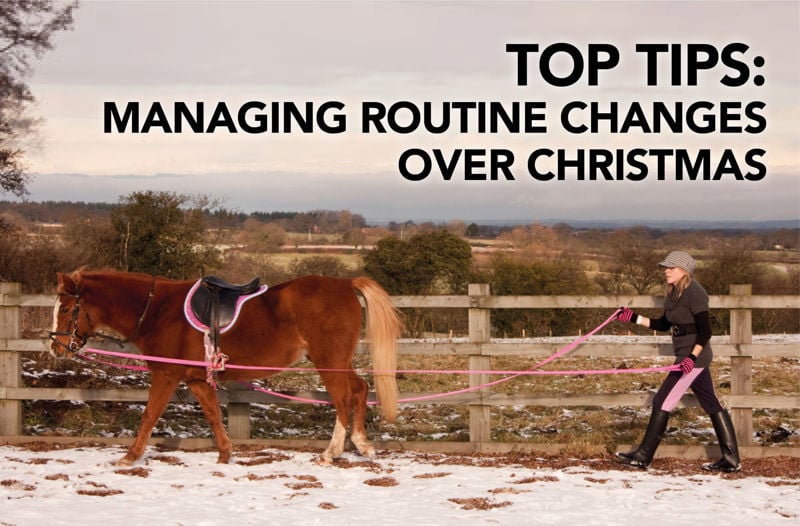We all know that it is important to maintain your horse’s routine to reduce the risk of stress and digestive issues. However, Christmas is a time when we often have to change our horse’s routine, sometimes at short notice. Here are Feedmark’s Top Tips for managing your horse's routine changes over the festive period.
Stabling
If you know your horse will be spending more time stabled, acclimatise them to this for a week or so before the festive period. Gradually increase stable time and start feeding hay/haylage in the field if you are not already to avoid sudden diet changes. If your horse will be spending more time stabled consider using a supplement to support optimal respiratory health, such as Feedmark Clarity™. Clarity™ is a powerful blend of herbs which soothe and support the respiratory tract, promoting clear airways and healthy lung function. Liquorice, Coltsfoot leaves, Elderflowers, Garlic, Lemon and Oregano are all included in this comprehensive supplement. Find out more here >>
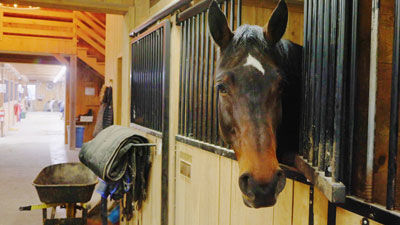
Foraging
To support optimal forage intake try offering multiple forage sources in the stable. Thorne et al. (2005) showed that when offered multiple forage options in the stable horses perform their natural foraging behaviours significantly more frequently and for significantly longer periods than when they were fed a single forage option. Interestingly weaving behaviours were only seen when horses were fed a single forage treatment, implying that weaving may be a result of horses not being able to perform their natural foraging behaviours. To replicate this in our stabled horses you can fed your hay/haylage as normal, but then also a bucket of short chop chaff, a bucket of grass chop and a treat ball with a low calorie fibre cube. Place these in different places in the stable to encourage browsing.
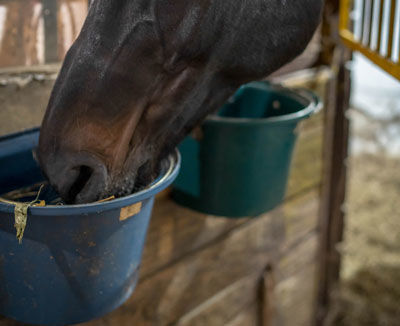
Treats
If you are planning on feeding a Christmas day treat remember that all diet changes should be made gradually over a 7 – 10 day period. Rapid diet changes can lead to microbial changes in the horse digestive tract, which in turn can lead to lose droppings, discomfort and colic. To support optimal digestive health during period of change consider using a supplement such as BioPro™. BioPro™ contains scientifically proven live yeast, Yea-Sacc®, which balances the population of microorganisms. This probiotic action optimises digestion rate and hindgut environment. Beneficial prebiotic, FOS, is also included to support healthy gut microbiota and intestinal activity. Find out more here >>
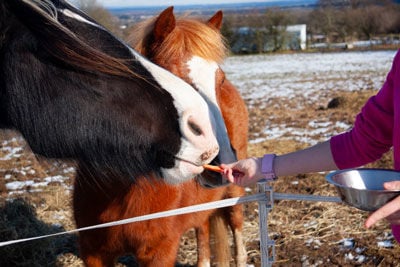
What to treat
Be careful when feeding your horse left over Christmas vegetables. Whilst many vegetables are great for horses, such as carrots, parsnips and swedes, some vegetables should not be fed. Brussels sprouts, cabbage, onions and white potatoes should never be fed to horses. When feeding vegetables it is important to always remember to cut up them lengthways to reduce the risk of choke.
Dehydration
Routine changes can lead to stress which in some cases causes horses to drink less. Dehydration is the main cause of impaction colic, especially in colder winter months, and no one wants a large vet bill over Christmas! Unpublished research by the University of Pennsylvania has shown that horses will drink up to 40% more water when the water is warmed to around 20°C. However, this was only when the warmed water was the only water source available.
If warm water and icy water were provided horses still preferred to drink the icy water, but they consumed much less. The study also showed that 82% of the water the horse drank occurred up to 3 hours after they had eaten their hard feed. To help ensure optimal hydration during the winter months give your horse warm water after they have had their hard feed and try to ensure it is the only water source available (Lenz, 2022). Other things you can do to increase water intake is feed haylage, soaked hay, or soaked feeds such as sugarbeet. You can also add salt to your horse’s diet to increase their thirst response.
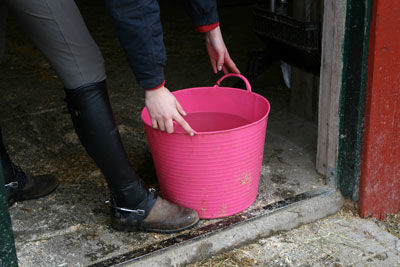
The Feed Room
Remember that many feed stores will be closed over the festive period. Make sure you are well stocked up on hay, feed and supplements so that you don’t run out. This will help to reduce the risk of having to make sudden diet changes.
Work
Although your horse may be in less work over the festive period try to spend time with them, and keep them moving as much as possible, especially if they are stabled. Taking rugs off and giving your horse a good groom will help to ensure you notice any rug rubs or injuries and will also help with bonding. Another idea is to take your horse for an in hand walk for some grass, or if you have a bit more time consider a ten-minute lunge or long rein.
If you have a horse whose legs are prone to filling, keeping them moving as much as possible is very important. You could also feed a supplement to support the lymphatic system, such as Feedmark No Fill™. No Fill™ contains the perfect blend of powerful herbs to support the lymphatic and cardiovascular systems. Marigold flowers and Clivers maintain normal fluid retention in the legs, along with Dandelions which aid excretion of excess fluid whilst keeping the liver and kidneys healthy. Hawthorn and Nettles support the heart, contributing greatly to optimal cardiovascular health along with Ginkgo, a herb with antioxidant properties that help to mop up free radicals. Find out more here >>
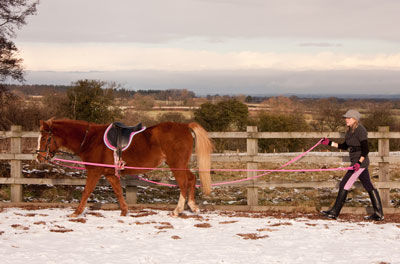
References
· Thorne, J.B., Goodwin, D., Kennedy, M.J., Davidson, H.P.B. and Harris, P. (2005) ‘Foraging enrichment for individually housed horses: Practicality and effects on behaviour.’, Applied Animal Behaviour Science, 94(1-2), pages 149-164.
· Lenz, T. (2022) ‘Winter Water Consumption’, Available here [Accessed 3rd December 2023)


